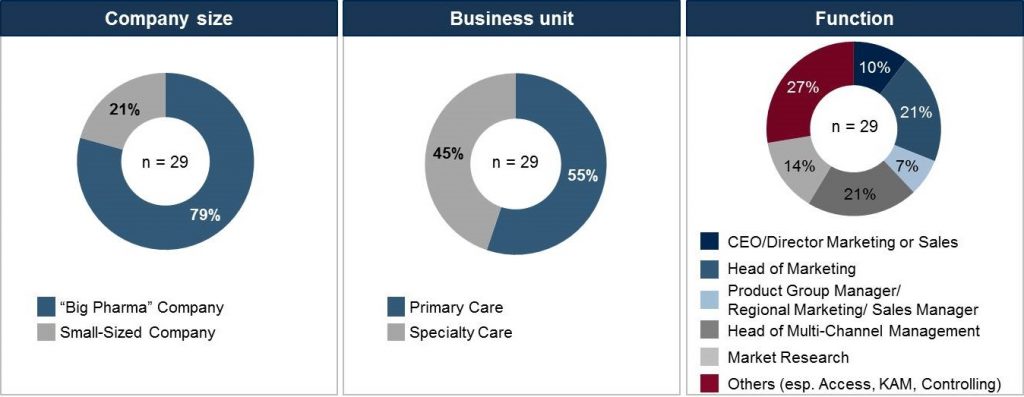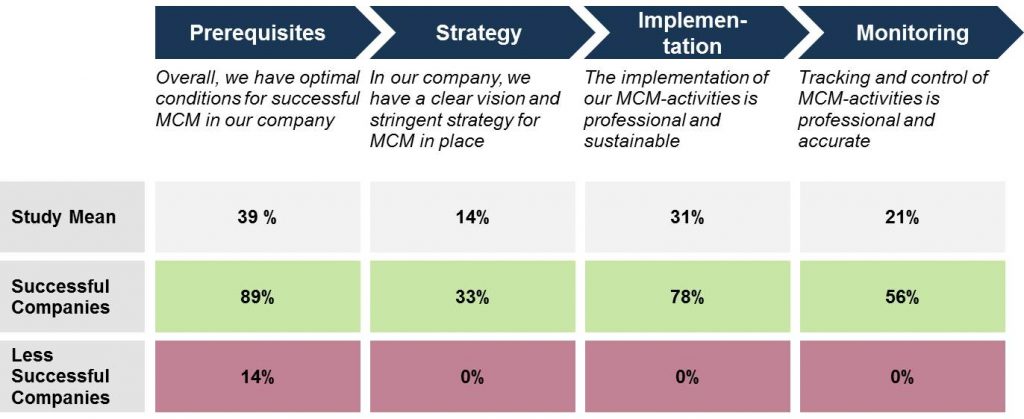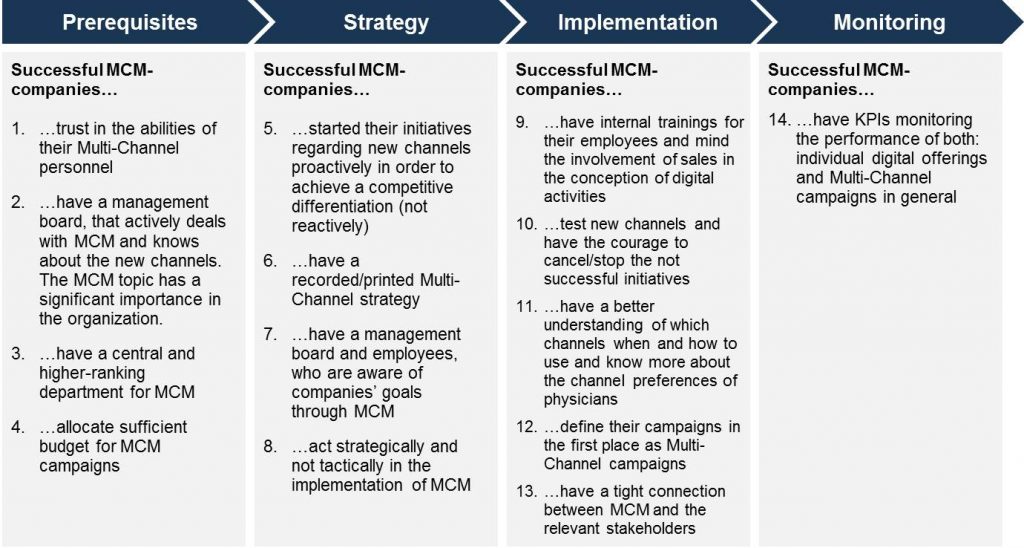1. Introduction
The pharmaceutical industry has been undergoing significant changes due to the increasing role of digital technologies. Traditional channels including face-to-face interaction with healthcare professionals through a field force are gradually being supported and even replaced by digital channels such as remote detailing through e-mail and phone, product websites, HCP-portals and social networks. Most pharma companies are striving to adapt to the ever-evolving environment by implementing multiple digital channels to reach their customers. But how aware and successful are the companies in reality in Multi-Channel Management (MCM)?
To understand the status quo of Multi-Channel Management in the pharma industry and determine the critical success factors that differentiate the more successful companies from the less successful ones, Homburg & Partner conducted an online survey with managers in various departments of national and international pharma companies located in Germany in October 2014.
2. Methodology
The survey consisted of 86 multiple choice and short text questions with an average duration of 10 minutes. Participants were asked to answer questions regarding the Multi-Channel preferences and settings in their companies.
A total of 29 managers took part in the survey, 79% of them representing multinational “Big Pharma” companies. 55% of the participants identified themselves within the “Primary Care” business unit, whereas the remaining 45% in “Specialty Care”. More than 50% of the participants occupy either CEO, Head of Marketing and Multi-Channel Management positions in their companies.
In the survey participating companies were classified as “successful” and “less successful” companies in Multi-Channel Management through splitting the top and bottom 30% based on their answers to hidden success questions in the questionnaire. This split was used to determine the MCM “success factors”.
3. Results
The four main stages of Multi-Channel Management were identified first. These are: Prerequisites, strategy, implementation and monitoring. According to the survey results, it was determined that successful companies are much better positioned in all stages of MCM.
a) Prerequisites for successful Multi-Channel Management
Successful companies assign the right people with appropriate skills in MCM and trust in their abilities. It was found that there is a direct correlation between experience in MCM (>3 years) and success. Companies involved in MCM for a longer period believe to have more skilled and successful employees in MCM. Furthermore, survey results interestingly showed that managers in Primary Care rated the skills of their employees higher than their colleagues in Specialty Care.
Consistent with the superior skills of their employees in MCM, successful companies as well have a management team that actively deals with MCM, is familiar with up-to-date digital channels and considers MCM as an important topic in the organization. Once again, managers in Primary Care trust in the MCM skills of their management team more than their colleagues in Specialty Care do.
Another important prerequisite for successful MCM is a suitable organizational structure. It was found that all of the successful companies had a central and higher-ranking MCM department led by an Ex-MCM, Marketing or Sales Manager. These companies assign sufficient budget to their MCM departments and support them by making significant investments in the implementation of required MCM activities.
b) Definition of the right Multi-Channel Management strategy and goals
Successful companies started their initiatives regarding new digital channels proactively, in order to reach a competitive differentiation instead of a reactive approach based on their competitors’ actions. Another important trigger for launching MCM activities is cost reduction.
These companies started their MCM activities with a clearly defined and recorded MCM strategy, mostly positioned on the business unit level, less usually on a company or product level. Furthermore, their actions in implementing MCM are a result of strategy instead of opportunity, which are tracked through clearly defined MCM KPIs.
Today’s goals for using digital channels include broader customer coverage and higher contact frequency, optimization of customers’ needs and cost savings. Successful companies differentiate themselves as a result of their management board’s and employees’ awareness of the companies’ goals through MCM. This is clearer at a management level and in small-sized companies compared to Big Pharma.
c) Implementation of Multi-Channel campaigns
Optimal change management and the integration of the sales team in MCM is a critical success factor. More successful companies plan internal trainings for their employees and ensure the involvement of their sales department in the design and conception of digital activities. Although this conclusion was reached through the statements of the participating companies, they also believe that in general their employees do not receive sufficient training regarding the use of new channels.
Successful companies have a clearer understanding of which channels to use, when and how to use them and generally have greater knowledge concerning the channel preferences of their customers, even though they do not implement the initiatives based on individual physician preferences. They test new channels before rollout and have the courage to stop the unsuccessful initiatives.
Optimal channel coordination is another requirement for the successful implementation of Multi-Channel campaigns. More successful companies have a strong connection between their MCM department and the relevant stakeholders as was observed in companies that defined a professional and sustainable MCM strategy. Furthermore, they define their campaigns as Multi-Channel campaigns in the first place and involve the relevant stakeholders in the implementation phase.
d) Monitoring Multi-Channel campaigns
Similar to other marketing and sales activities of the companies, Multi-Channel campaigns must also be monitored and their performance should be measured and assessed. Successful companies accomplish these through setting SMART KPIs and tracking the performance of both, individual digital offerings and general Multi-Channel campaigns. According to the survey, click rates, amount of time spent by the customer on MCM and the coverage are the most commonly named KPIs for digital offers. On the other hand, customer satisfaction, return on investment and customer coverage are counted as the most important KPIs for general Multi-Channel campaigns.
4. Summary & Conclusion
In all four stages of MCM, more successful companies are outperforming less successful companies by taking measures aligned with the critical success factors.
Even though use of digital channels are becoming more and more common in German pharmaceutical industry, results of the survey further reveal that there is still room for development regarding MCM, especially in defining the right MCM strategy and goals and monitoring the implemented Multi-Channel campaigns. Most of the participants state that their employees are not trained enough on MCM, that a clear MCM vision and strategy are missing and that controlling of Multi-Channel campaigns is not professional and accurate enough in their companies. All of these findings show us that pharma companies have to further adapt MCM and focus on the mentioned fields of development to succeed in the competitive, dynamic and rapidly changing pharma market.





